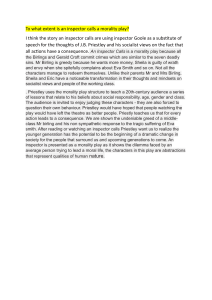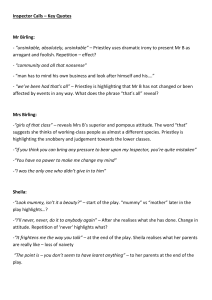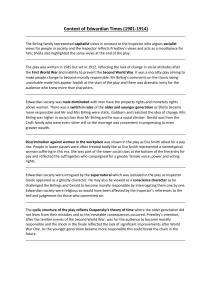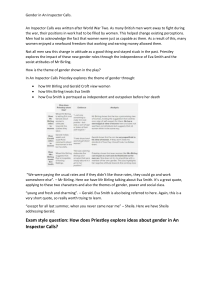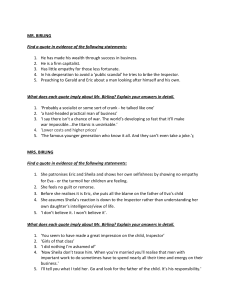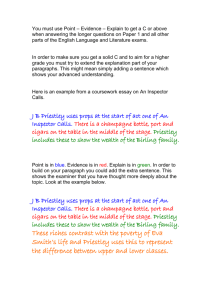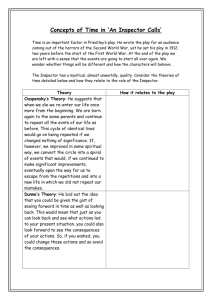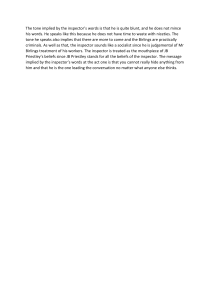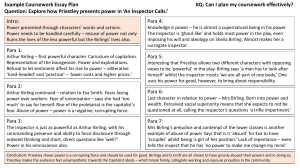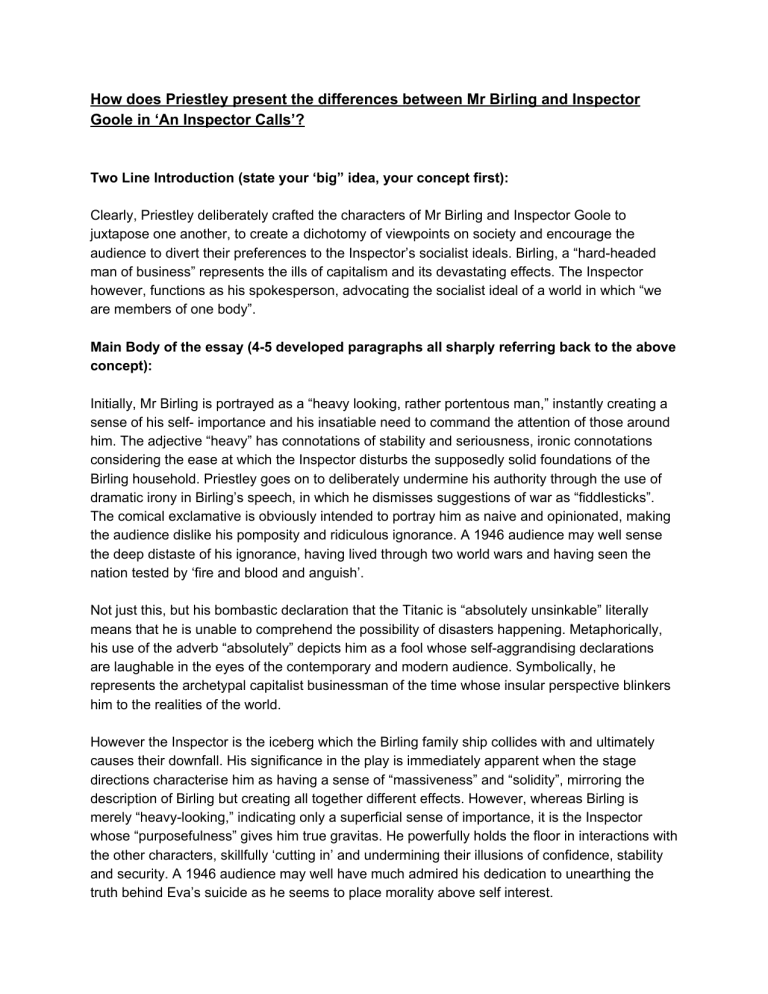
How does Priestley present the differences between Mr Birling and Inspector Goole in ‘An Inspector Calls’? Two Line Introduction (state your ‘big” idea, your concept first): Clearly, Priestley deliberately crafted the characters of Mr Birling and Inspector Goole to juxtapose one another, to create a dichotomy of viewpoints on society and encourage the audience to divert their preferences to the Inspector’s socialist ideals. Birling, a “hard-headed man of business” represents the ills of capitalism and its devastating effects. The Inspector however, functions as his spokesperson, advocating the socialist ideal of a world in which “we are members of one body”. Main Body of the essay (4-5 developed paragraphs all sharply referring back to the above concept): Initially, Mr Birling is portrayed as a “heavy looking, rather portentous man,” instantly creating a sense of his self- importance and his insatiable need to command the attention of those around him. The adjective “heavy” has connotations of stability and seriousness, ironic connotations considering the ease at which the Inspector disturbs the supposedly solid foundations of the Birling household. Priestley goes on to deliberately undermine his authority through the use of dramatic irony in Birling’s speech, in which he dismisses suggestions of war as “fiddlesticks”. The comical exclamative is obviously intended to portray him as naive and opinionated, making the audience dislike his pomposity and ridiculous ignorance. A 1946 audience may well sense the deep distaste of his ignorance, having lived through two world wars and having seen the nation tested by ‘fire and blood and anguish’. Not just this, but his bombastic declaration that the Titanic is “absolutely unsinkable” literally means that he is unable to comprehend the possibility of disasters happening. Metaphorically, his use of the adverb “absolutely” depicts him as a fool whose self-aggrandising declarations are laughable in the eyes of the contemporary and modern audience. Symbolically, he represents the archetypal capitalist businessman of the time whose insular perspective blinkers him to the realities of the world. However the Inspector is the iceberg which the Birling family ship collides with and ultimately causes their downfall. His significance in the play is immediately apparent when the stage directions characterise him as having a sense of “massiveness” and “solidity”, mirroring the description of Birling but creating all together different effects. However, whereas Birling is merely “heavy-looking,” indicating only a superficial sense of importance, it is the Inspector whose “purposefulness” gives him true gravitas. He powerfully holds the floor in interactions with the other characters, skillfully ‘cutting in’ and undermining their illusions of confidence, stability and security. A 1946 audience may well have much admired his dedication to unearthing the truth behind Eva’s suicide as he seems to place morality above self interest. As the play progresses, Priestley repeatedly employs emotive language when the Inspector relentlessly reminds the Birling family how Eva Smith died: “Burnt her inside out, of course.” The dyphemism and violent verb “burnt” juxtaposes the calm, almost casual “of course”, indicating possible sarcasm. Literally, this means she suffered a painful death. Metaphorically, it depicts the emotional suffering of a young woman falling prey to the ruthless behaviour of the arrogant Birlings. Symbolically, it represents the suffering of “millions and millions” of working class people who could not survive within a harsh Capitalist society. Priestley sought to expose, through the Inspector’s characterisation the great plight of the working class in a society riddled with class divide. He sought to inspire a sense of collective responsibility and community spirit, reminding audience members that ultimately, we are ‘all members of one body’. Here the noun ‘body’ suggests that class division should not exist as everyone in the world are essentially one society. It also has connotations of a human body, because if one part of the body, such as the heart, was to stop working the whole body would shut down. Priestley’s intention to expose the insensitivity and callous nature of many of the upper class is further reinforced by the Inspector’s final speech, in which he authoritatively declares that “We are all responsible for each other.” By this point (In Act 3) the Inspector has successfully attacked the foundations of the Birling family and completely destroyed their façade of respectability, thus gaining the audience’s admiration. Therefore it is this point at which Priestley uses Inspector Goole as the embodiment of Socialist values and moral authority in the play. Ultimately, he reminds the audience that their decisions and behaviour have consequences which need to be carefully considered. Swiftly conclude but summing up the key strength of your argument: The fact that Mr Birling is only concerned for his reputation and “knighthood” at this point further makes a mockery of him, and therefore Capitalism itself. But by presenting the Socialist ideal of a world in which “we are not alone”, Priestley, through his indomitable mouthpiece, is able to present us with an alternative vision of the future that is inspirational and ethical. Grade 9 essay Structure for AIC’s: STEP ONE: The Introduction: In your introduction, you need to set up the parameters for debate – your big bossy idea that will be constantly referred back to in the main body of your essay. This means you need to outline your argument and show that you know exactly what the question is asking you. You will also need to show how you are going to focus your answer. If you are asked about a character, you should provide an overview of this character’s importance to the play and his/her function. If you are writing about a theme, you should talk about how that theme pervades the play and the reason you find it important. If you are asked about the opening or ending of the play, you should ensure you open by talking about its significance to the play as a whole. Here’s an example of a meaningful, purposeful Introduction: 1) ‘An Inspector Calls’ on a character focus question : Within Priestley’s morality play he utilises the Birling’s Edwardian household as a microcosm for the damaging ramifications of the values rampant before the two world wars. His play explores the ills of capitalism, of the failures to assist the ailing poor, but ultimately of encouraging collective responsibility. He achieves this through the characterisation of ____________ who embraces/rejects such values by the close of the play. 2) What is the function of Sheila in An Inspector Calls? Sheila has been celebrated as the most dynamic character in the play by many readers and viewers of ‘An Inspector Calls’. This is because she is deliberately crafted as a mouthpiece for Priestley as well as being a physical representative of the younger generation – a generation that has the potential power to aid the socialist progression of society. Whilst she has been raised as a member of the upper middle class, she is able to shake off her capitalist views in favour of a more socialist perspective, encouraging her family to recognise the importance of looking after those in less privileged positions. Sheila, by the end of the play, is indeed the very portrait of change Priestley sought in a post WW2 context. Step two: The main body of your essay for a character based essay: For character questions you might want to break it down like this: Section 1: How the character is presented before the Inspector’s arrival – contrast with another character e.g. Sheila vs her mother Section 2: How the character is presented when they hear the news of Eva Smith – compare and contrast with other characters; Section 3: How the character is presented during their interrogation – compare or contrast with another character and also discuss how the inspector treats them. Section 4: How the character is presented at the end of the play once the inspector leaves – compare and contrast with other characters. For each of the sections identified above, you need to do the Following: – Provide a clear topic sentence, e.g. When we are first introduced to Sheila, we feel…..; – Provide at least one piece of evidence from the play, ideally 2-3; – Analyse the evidence (the language) and provide inferences about the character, using analytical verbs from your word bank; – Contrast or compare with another character; – Explain how Priestley may want us to feel about the character and how this connects to his ideas. For some of the sections, you need to also: – discuss a dramatic device used at this point in the play e.g. stage directions. entrances and exits, props etc. – introduce contextual information to develop your interpretation of character. Approaching a theme based question: A typical question might appear like this: How does Priestley present the theme of conflict in An Inspector Calls? The structure for an essay on themes is fairly straightforward. You need to decide on 3-4 ways in which the theme is presented and then examine each of these in turn. Try to have something unusual up your sleeve for your final paragraph. Remember, that for each section of your essay, you need to follow the same rules as above also. Essays on structure / specific scenes Sometimes, you will be offered a question which is a little unusual SO expect the unexpected. It may ask you to consider a part of the play and its relationship to a whole, or it may draw your attention to a structural device. These questions can be more challenging in terms of how to organise your response. An example: How is the opening of An Inspector Calls effective in setting up the events and ideas in the play? In order to tackle this, you will need to decide on four key aspects of the opening scene to explore, but you will still need to talk about the play as a whole since the question asks about the scene’s importance to the events and ideas presented later. Here is an example plan for tackling this question: 1. The use of lighting – the mood created and how this changes later in the play; 2. The use of props – how atmosphere is created and what these props symbolise, linking to ideas later in the play and context of Edwardian era; 3. The stage directions and what we learn about each character merely from first impressions – how these are then demonstrated later in the play; 4. Edna – her voice and lack thereof; 5. Birling’s big, bold speeches; 6. The sharp ring of the doorbell – how it provokes a change in events, mood, ideas, and how it links to what happens at the end of the play; 7. Any early foreshadowing. The Tricky Conclusion If in doubt, leave it out! A conclusion is important in drawing your ideas together, but there is little worse than a bad conclusion! If you are simply going to waffle and repeat yourself, stick to a very brief and compelling single sentence to round off your essay. If, however, you wish to gain access to the higher levels of the mark scheme, you need to develop a carefully crafted conclusion to your debate. You should draw together your ideas to formulate your overall view on the theme or character, and ideally say something compelling to leave your essay on a high. The conclusion is to give your essay a sense of completeness and let your readers know that they have come to the end of your argument. It might restate the thesis in different words, summarise the main points you have made, or make a relevant comment about the literary work you are analysing, but from a different perspective. Do not introduce a new topic in your conclusion. Example conclusion: What is the function of Sheila in An Inspector Calls? By the time we reach the final moments of the play, Sheila has fallen silent, along with the rest of her family. However, this is not the silence of guilt; it is the telling silence of defeat: she has tried desperately to convince her family to “learn something” and reproaches them like a parent when she exclaims “It frightens me the way you talk”, but all of her efforts have been in vain. We see her as a reformed character and recognise Priestley’s cry for help from his audience – we are all left wanting to help Sheila in her quest to change the stagnant dangerous attitudes of the upper middle class – attitudes that repress the lower class citizens of society. Therefore, we can see that Sheila’s function is not merely to teach simple lessons about looking after thy neighbour, but political lessons: we need to learn from the mistakes of our past, which led to two harrowing world wars, and seek to create a more caring and inclusive society. So you see, in the end all essays have a process and a logic behind them. Just make sure you’re saying something passionate and telling throughout. Never forget that the play is a construction and serves a political purpose. The characters aren’t real people but serve metaphorical and allegorical functions. Your essay must be well structured, but it must also be a display of your passion for the text itself – let this shine through the formalities. So why is the Inspector so important? Ultimately, The Inspector as a character, has been forged by Priestley into a vehicle through which to air his political views. Our influential protagonist is a real enigma by the end of the play; audiences might indeed question his nature – some may be inclined to see him as some omniscient, omnipotent and benevolent supernatural force and yet is this really the point? For Priestley, the character’s ambiguity at the close of the play is in fact beside the point. As judge and jury, his moral outlook and teachings deliver judgements and social analysis and that is truly the force of the play. The Inspector serves multiple functions with the play: - To make the character confess their actions - To control and encourage speech and movement on stage - To instigate moments of tension and intrigue - To act as a vehicle for Priestley’s moral message - To encourage the characters and audience to learn from the mistakes of the past Mrs Birling’s Characterisation: Self-confident/ arrogant = Clearly she feels that her viewpoints and perspectives are the accepted norm. She faces the Inspector’s interrogation of her immoral behaviour with a searing arrogance that immediately establishes her as the pivotal antagonist of the play. Indifferent/ heartless = When confronted with Eva Smith’s plight when managing a chair on the Brumley Women's Charity Organisation, Sybil displaying an unrelenting indifference. She is unwilling to crack her ‘cold’ demeanour even as a woman and a mother she fails to enact any empathy. Controlling/ condescending = In conversation with her ADULT son and daughter, Mrs Birling frequently engages in a superior, haughty tone that seems to communicate that she feels disappointed in their achievements (or lack of). She extends this treatment to Eva Smith when she dismisses her as merely a girl ‘of that class’. She frequently seeks to exert control over the Inspector (‘please don’t contradict me like that’) which appears futile when the audience (and Sheila) grow to realise that his cannot be duped. Conservative / capitalistic = She admits she was “prejudiced” against the girl who applied to her committee for help and saw it as her “duty” to refuse to help her. Her narrow sense of morality dictates that the father of a child should be responsible for its welfare, regardless of the circumstances. Such conservative views on gender are thoroughly regressive and a far cry from the gender equality Priestley sought in post WW2 society. Indoctrinated = Equally, we must remember that Mrs Birling is a construct created by the playwright for a range of reasons. Certainly we must acknowledge that while we heap the blame upon her for her prejudice, she was brought up in Edwardian society, indoctrinated and defined by it. Priestley launches an attack on this society through Mrs Birling. There is always more beyond the character. Remorseless/ unrepentant = At the end of the play, she has had to come to terms that her son is a heavy drinker who got a girl pregnant and stole money to support her, her daughter will not marry a good social ‘catch’ and that her own reputation within the town will be sullied. Yet, like her husband, she refuses to believe that she did anything wrong and doesn’t accept responsibility for her part in Eva’s death. She is ultimately unrepentant and fails to learn anything of worth outside her own self-interest. Sheila’s Characterisation: Spoilt = Sheila is certainly overindulged and vain at the beginning of the play, displaying an insatiable desire for material possessions. Hopeful = Sheila’s character development carries an assertive message of hope for the audience. In the course of one evening she subverts her less favorable characteristics and adopts a more humanist ideology. Her redeeming qualities suggest that all members of society can indeed alter their perspectives for the better. Empathetic = Upon hearing of her part in Eva’s suicide,Sheila vocalizes her sincere empathy – as a young woman she acknowledges the parallel between herself and Eva: she could so easily have been born into a lower socioeconomic background and faced the hardships that drove Eva to the ultimate form of escapism. Immature = Sheila has sustained a child-like existence through benefiting from the privilege of not having to leave the comfort of the domestic sphere to work a menial job and support her family. She lacks exposure to the wider social sphere and is largely ignorant to the ills of society. Liberal = Sheila’s views, closely aligned with that of the Inspector’s socialism, paint a liberal picture. Having been deeply impacted by the quasi paternal figure of the Inspector, the impressionable Sheila seeks to partake in creating a more benevolent society, based around the principles of equality. Sheila undoubtedly becomes the conscience of the play. Assertive = Throughout the course of the play Sheila’s dialogue alters; she goes from employing child-like diminutives (‘mummy’) to openly challenging the authority of the older generation. Her dialogue begins to mirror that of the Inspector as she cuts in and mirrors the sense of urgency contained in the Inspector’s final speech. Context: the valuable stuff: 1912: what a time to be alive. Edwardian Britain undoubtedly catered for the upper social classes, ensuring the rigid social hierarchy maintained the status quo (the rich and influential as superior to the lowly and less affluent social classes). There were of course clear distinctions between the social classes, and many who had benefited from the Industrial Revolution sought to keep the rich wealthy and the poor needy. Folks like Mr Birling were heavily fixated on personal and monetary gain at the expense of the submissive workforce because ‘lower costs and higher prices’ meant they made the highest profit possible for the lowest wage given. Women were also confined to the domestic sphere in limited private lives that had no influence in wider political contexts. As a female you were expected to conform to a set of gender expectations: meek, mild, subservient and voiceless. Women were expected to be seen and not heard. Ultimately, a woman’s biological destiny (to procreate and provide an heir) made their lives especially small and trivial. Mrs Birling is a clear example of a woman indoctrinated to think and feel that her gender are entirely submissive to their male counterpart’s whims. She encourages her daughter’s ignorance throughout the play, dismissing her progressive and liberal transformation as childish folly. Is Mrs Birling however fully accountable for her prejudices and reinforcements of damaging gender stereotypes? Or is she essentially a victim of society itself? Some argue that she is offered a redemptive opportunity with the Inspector’s arrival and fails to learn anything. Her rejection of responsibility and accountability for Eva’s suicide ultimately encourages an audience’s disdain, and thus reinforces Priestley’s urgent message of social change which needed to be pioneered by the more ‘impressionable’ younger generations. Writer’s Intentions: Priestley deliberately set his play in 1912 because the date represented a heavily conservative era. Despite this, by 1945, most of those class and gender divisions had been breached. Priestley wanted to highlight the advancements these changes has brought and so did this through his political play first performed in Britain in 1946. Through this deeply socialist play, he encourages people to seize the opportunity at the end of the war had given them to build a better, more benevolent society. He wanted people to made strides towards greater equality and not regress to the limiting ideologies and viewpoints of the Edwardian era. ‘We don’t live alone. We are all members of one body. We are responsible for each other’ – The Inspector (Act 3)
